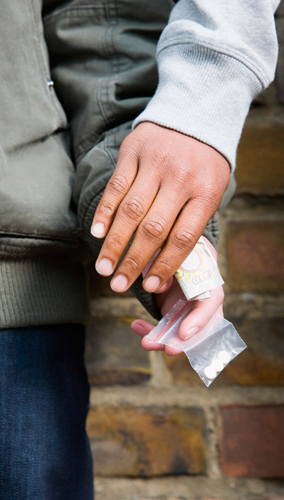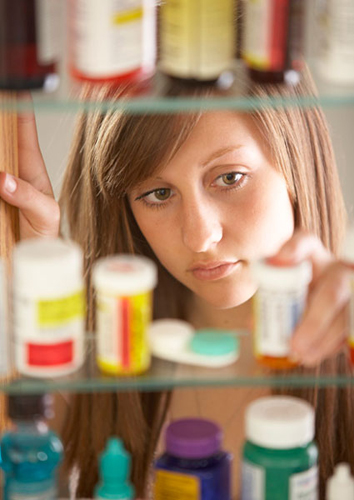| Q: |
I heard my son being teased by his friends for being a virgin, and I had very mixed feelings about this.
| | A: |
This would no doubt make him desperate to lose his virginity, and
you can probably empathize with that. On the other hand I am sure you
do not want him to rush into having sexual intercourse, just to be one
of the gang. Peer pressure is massive when it comes to sex, drinking,
and drugs. On the whole, boys are glad to have lost their virginity
while girls are more likely to have mixed feelings, and a small
percentage really regret it. It probably would not be a good idea to
directly discuss this overheard incident with your son.
However, you may be able
to engineer a conversation later that generally covers the topic of
sexual experience and peer pressure. It is doubtful that all those doing
the teasing were as experienced as they may have seemed to him at the
time. You may be able to get him to think of all the boys he knows who
are still virgins and why so much pressure is put on them to have sex
just for the sake of it.
|
| Q: |
I worry about my daughter’s safety. You hear so much about date rape. What advice can I give?
| | A: |
Victims of date rape are almost always female, so sexual safety
is an important topic of conversation with your daughter. Your general
message should be that her body is her own and that she should be alert
to other people’s assumptions that they can do what they want with it.
The advice you gave her as a young girl, that no one has the right to
touch her, applies just as much now that she is a teen. However, now she
needs to be particularly aware of how her behavior may be misconstrued,
especially on a date. She must be clear with her date about what she
wants to do and what she does not want to do. Young girls often believe
that once you start a sexual activity, you have to go through with it.
Impress upon her that she can say stop at any time and she can say “No”
to sex even if she has had sex with that person before.
Alcohol safety is
another aspect of staying safe when out. Even if she doesn’t drink, your
child can be victimized by a spiked soda. Advise your daughter and her
friends not to leave drinks unattended, and to stop drinking immediately
if a drink tastes odd and they think it has been spiked. If any one of
them begins feeling odd, they should make sure to stay together and look
after her. Encourage your daughter not to drink or take drugs, as this
will interfere with her ability to make sound decisions and keep control
of the situation. Finally, discuss emergency escape measures, should
the situation become more coercive or violent. Screaming, fighting, and
running away may be options. Self-defence training is a sensible course
of action for any young female; it will train her in strategies to
disable an attacker. However, sometimes fighting is not a viable course
of action and can make the situation much worse—if, for example, the
attacker is armed. In this situation, survival is all that is important.
Tell her it is not her fault and help her to report the rape to the
police.
If you are also the parent
of a son, educate him to respect girls and their decisions about their
bodies. Boys must learn sexual self-control and understand the
consequences of their actions, including the legal ramifications of
rape.
|
| Q: |
My daughter is sleeping around. What should I do?
| | A: |
Is it possible that your daughter is using sexual promiscuity as a
form of rebellion against you? It could be a way of challenging your
control and establishing her independence from you. You are right to be
concerned, as it is a high-risk form of rebellion. However,
confrontation is probably not going to help. The best course of action
would be to find a way to talk with your daughter in a calm and caring
manner. It may be the case that you have had difficulties in your
relationship prior to her current sexual activity. This could be part of
the reason that she needs to rebel in such an extreme way. This may be
the time to seek professional help for you both to look at your
relationship and for her to think about the meaning of her behavior.
|
| Q: |
What if my child uses drugs?
| | A: |
Two out of three young people have tried marijuana before the age
of 18. You cannot prevent your teenager from having access to illegal
substances, but you can make sure that you have information about
different drugs and their effects, and the confidence to help her make
good decisions when she encounters them. Talk to her about drug use in a
calm and open way. Don’t exaggerate or lecture, or you’ll risk putting
her off having these conversations with you—and they do need to be
ongoing. Explain the harm drugs can do, both physically and
psychologically. She might be surprised to hear how even such a
widely-used drug as marijuana can cause damage to mental health. Talk
about the harm it does to others, parents and siblings particularly, but
also to friends. You could also mention links between the drugs trade
and organized crime. It is worth being clear, informed, and factual
about the legal implications of being caught with different types of
drugs. There are excellent websites with this information available.
Discuss peer pressure as this has an influence on your daughter’s
decision making. You might work through a typical scenario with her:
You’re in the park with your friends, somebody offers you a joint,
everyone else is doing it, what do you say? See what she suggests. Maybe
she’d just take it and pass it to the next person. If her friends
pressure her, she can say something like, “No thanks, I don’t smoke.”
Help her to be prepared with a rehearsed defence if she feels she may be
put under pressure.
|
Drug use: signs to look out for
Many of the signs
of drug use on their own may be perfectly innocent, typical adolescent
characteristics, so go carefully and do not jump to conclusions.
However, unless you actually witness your teenager in the act of drug
taking, it can be hard to be sure. The following may help. Physical
signs such as red or altered eyes (dilated or constricted pupils),
rashes or spots, general ill health, colds and coughs, bruising, weight
loss or gain, not caring about appearance and hygiene, and poor sleep.
In extreme cases, you may see track marks from injecting (although, if
your child has these she is likely to conceal them under clothing).
Behavioral signs might
be: Lying about activities and whereabouts, secretive phone calls and
activities, loss of interest in usual activities, going out every night,
new friends, deteriorating performance in school, missing alcohol or
prescription drugs from home, frequent requests for or missing money and
valuables, mood swings, hyperactivity and aggression, withdrawn
behavior, locked doors, unusual smells on clothing or breath, or unusual
wrappers or containers, such as plastic “baggies” (ziplock bags,
occasionally with logos) in pockets.


|